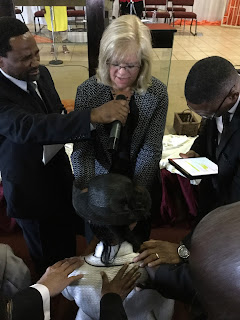Do Not Ordain Hastily
Scripture:
1Tim. 5:22 Do not ordain anyone hastily, and do not participate in the sins of others; keep yourself pure.
Observation:
Timothy may have been a very compassionate and sympathetic individual, but that could have led to problems in the church. There are two ways to see this passage of scripture. One has to do with the selection of leaders who are a part of the church. To avoid scandals, those who are to be in positions of leadership are to be well examined. There should be a process and a period of time in which the life and character of the individual is examined. Ordination is never a right, but it is a covenant of grace bestowed upon an individual by the church.
Those who lay hands on an individual to be ordained bear responsibility for the future actions of those who are receiving ordination. This is why the ones who do the ordination must carefully examine and prepare those to be ordained. This is also where the second concern may have occurred, and that relates to individuals who were ordained but who have been under discipline. The restoration of an individual is to take time. The point about participating in the sins of others, relates to either a hasty ordination, or a hasty restoration. The problem is that if these individuals partake in sin, the ones who have laid their hands on them, become participants of that sin as well. By ordaining an individual and putting them in a place of authority without taking the time to thoroughly examine their life, character and witness, the ordainer is participating in the sins of others.
The final admonishment is clear; “keep yourself pure.” The elder is to keep themselves pure, and this includes being cautious of what they endorse. Endorsement signifies support and should something go wrong, there is great responsibility.
Application:
Having spent time in the last few weeks ordaining individuals into ministry, this text certainly caught my attention. There is something amazing about participating in the ordination of an individual, and it feels like a very heavy, serious, and sacred moment. Ordaining those to serve in the church and before God is the serious work of the church, and it takes the whole church to be a part of the process. At the local church level we should identify those who have been called of God into ministry. Sometimes the church participates by noticing those who have the gifts and graces of ministry and they mentor and help to develop these individuals. In our tradition the local church boards affirms the call and provides the first local preacher’s license.
 |
| Seteki, Swaziland, ordination. |
While the process begins in the local church, it eventually becomes a part of the responsibility of the larger, district church family. The person called to ministry must take time to study and prepare to be ordained. Far too often these days I find that people are looking for a short-cut, the easy way to get through those classes to ordination. I’m saddened by this trend, because it seems to me that those who are called to lead the church would want to get the best education that they possibly can to be able to lead others. The cheapest and shortest route to ordination is not necessarily healthy for the church, nor the individual. “Don’t ordain anyone hastily.” There is a reason for serious theological education. Much of 1 Timothy refers to the heresies that were floating around the community and the problems that this was causing in the church. Poor theological education is often to blame for misunderstandings, even regarding our most basic tenets or Articles of Faith. No one needs to be in a hurry to be ordained, and all should want to take the time to learn all that they can, to be the very best servant of God.
Some churches want to choose their leaders far too hastily. Others don’t want to disrupt the church by disciplining a pastor and are willing to simplify a process to try and retain the status quo. I’ve seen this in churches (not in our tribe) where a pastor has an affair, loses his marriage, and yet, the church decides to keep him in a position of leadership. He’s a popular leader, and if they lose him, they’re afraid of what will happen to the church. This passage says that if we do that, we are actually participating in that individual’s sins. Also, we may be participating in the sins of many others, because we’ve just sent a message to the congregation, and to the world that we are not serious about sin. Or, that certain sins really aren’t that big of a deal.
There is an issue of purity here. There is a requirement of purity for those who are in leadership in the church. There is a requirement for the church to examine those to be in leadership and require purity as well. There will be those who want to be church leaders, who may have the administrative and speaking skills, but who may not be eligible because they would not pass the examination. There is a reason for the examination, and for an individual to be accountable to the church and the system, because the ordained individual represents Christ to the church and the world. That is a huge responsibility.
There should be no short-cuts to the ministry. We need to all take seriously our responsibility in the appointing of leaders among us. God’s people need to embrace purity in Christ, and continue pressing on toward the goal of complete and total participation in this journey with our Lord.
Prayer:
Lord, I pray that your church here on earth would be a reflection of your kingdom. Amen.
Comments
Post a Comment